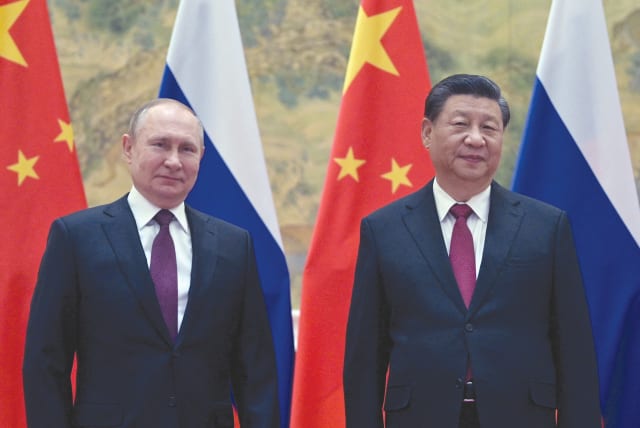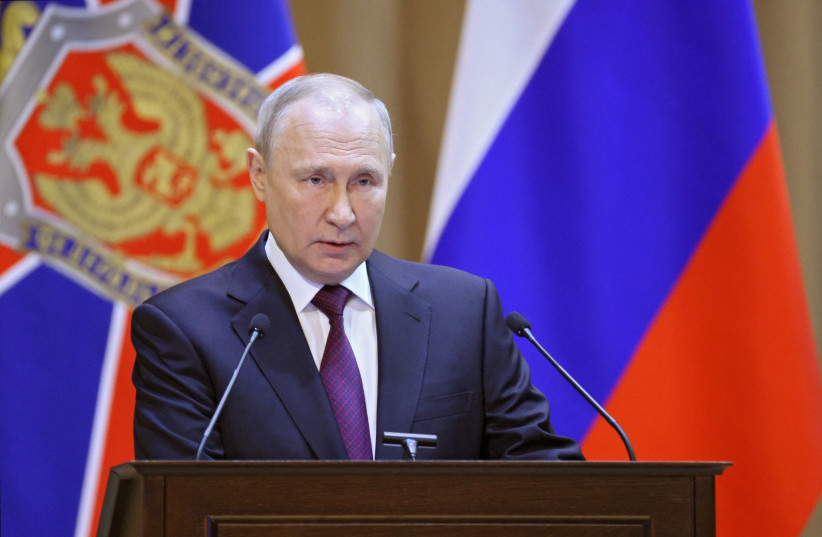What are the key issues to watch for in the China-Russia meetings? - analysis

Reports say that the sides will discuss Russian-Chinese cooperation in the international arena. Important bilateral documents are supposed to be signed or at least come out of these meetings.
The meeting between China’s leader Xi Jinping and Russia’s President Vladimir Putin will be closely watched worldwide, as it comes in the wake of Putin being issued an arrest warrant by the International Criminal Court for war crimes and a surprise recent visit to parts of Ukraine that Russia is currently occupying. This indicates how keen Moscow is to show that business is being carried on as usual.
China, for its part, has been cautious in its wording regarding Russia’s invasion, saying it could play a “constructive role” in ending the conflict. It has also said that its relations with Russia are at a high point in history. This makes the trip by the Chinese leader not only historic and symbolic but could be indicative of tangible results.
The meetings are expected to take place through Monday night and possibly into Tuesday. Official sources have said that this will include discussions of “current issues of further development of relations of comprehensive partnership and strategic cooperation between Russia and China.”
Messaging
The leaders, as well as their state media, have been blasting out messages about the visit ahead of its occurrence, with Putin indicating that current ties between Moscow and Beijing are higher than during the Cold War.
“At the invitation of President Vladimir Putin, I will soon pay a state visit to the Russian Federation. Russia was the first country I visited after I was elected president 10 years ago,” Xi said in an article over the weekend. “Over the past decade, I have made eight visits to Russia. I came each time with high expectations and returned with fruitful results, opening a new chapter for China-Russia relations together with President Putin.”
The wording used here is important to note. Is this relationship an official partnership? What are the levels of bilateral ties and how are they being characterized?
Putin has frequently spoken of an international system in which Russia challenges the US-led world order to more match Moscow’s desires. Will China hint at confronting the West?
Bilateral agreements
Reports have said that the two sides will discuss Russian-Chinese cooperation in the international arena. Important bilateral documents are supposed to be signed, or at least to come out of these meetings.
Russia is in desperate need of weapons, drones and munitions, yet China has been reluctant to become an arms bazaar for Moscow. However, that might change if China thinks that it can benefit from the deal.
At the same time, there may be other bilateral agreements, relating to technology transfer or industries and currency, which are important for Russia to evade Western sanctions and shore up its economy.
Overall, these kinds of documents and any new official decisions will ultimately reveal whether China and Russia believe they can confront the West, insulating themselves from Western sanctions by boosting their own economies. If they can, this will further empower their allies, such as Iran.
“China and Russia have found a right path of state-to-state interactions,” Xi stated. “This is essential for the relationship to stand the test of changing international circumstances, a lesson borne out by both history and reality.”
He has indicated that China wants to boost “coordination and planning” with Russia and to use “creative thinking” to find new opportunities to work together. These are very generalized terms; it will be important to see concertized agreements coming out of them.
Is China serious about a Ukraine peace proposal?
China has indicated that it supports Russia reaching some kind of settlement in Ukraine – at stake here for China is whether it believes the war is a net benefit for Beijing or not. China is skeptical of the Western-led world order, but also has historically wanted to play a cautious role in that.
Beijing has generally eschewed getting involved in conflicts and prefers initiatives that it thinks will lead to stability and economic progress. That is why it helped seal a deal between Saudi Arabia and Iran – its goal is more reconciliation under a Beijing-led world order, rather than more wars and conflicts that erode its initiatives.
“My upcoming visit to Russia will be a journey of friendship, cooperation and peace. I look forward to working with President Putin to jointly adopt a new vision, a new blueprint and new measures for the growth of China-Russia comprehensive strategic partnership of coordination in the years to come,” the Chinese president said, according to reports.
Middle East
China and Russia both play a role in the Middle East. Russia has hosted Turkey and the Syrian regime in recent months to try to reconcile them. China has hosted the Saudis and Iranians. This means both countries are making moves in the region. Both countries work with Iran, which is a sworn enemy of Israel, which could also empower Iran’s nuclear weapons, missile and drone programs.
The Russia-China meeting may not mention the Middle East explicitly, but it will be important to see how the alliance between Moscow and Beijing is progressing and how this might have an effect on the region.
If China and Russia decide to cement a more open anti-Western alliance, especially in the wake of Putin’s arrest warrant, it could have major ramifications for the Middle East.
If, on the other hand, China remains cautious regarding Russia’s moves, it may send a signal that a world order untethered from the norms of the last decades has not fully emerged. The general moves in the Middle East have been toward more peace and prosperity in relations. This is a move away from the era of proxy wars and terrorism.
Jerusalem Post Store
`; document.getElementById("linkPremium").innerHTML = cont; var divWithLink = document.getElementById("premium-link"); if (divWithLink !== null && divWithLink !== 'undefined') { divWithLink.style.border = "solid 1px #cb0f3e"; divWithLink.style.textAlign = "center"; divWithLink.style.marginBottom = "15px"; divWithLink.style.marginTop = "15px"; divWithLink.style.width = "100%"; divWithLink.style.backgroundColor = "#122952"; divWithLink.style.color = "#ffffff"; divWithLink.style.lineHeight = "1.5"; } } (function (v, i) { });

